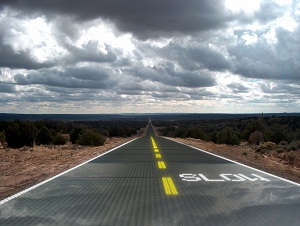Solar Roadways to develop parking lot
 Scott and Julie Brusaw are ready to show the world that we could build solar-collecting, energy-producing, safe and smart roadways.
Scott and Julie Brusaw are ready to show the world that we could build solar-collecting, energy-producing, safe and smart roadways.
And by ready, they mean everything is in place. The Sagle, the Idaho couple’ s Solar Roadways enterprise, received a $750,000 Small Business Innovation Research grant from the federal highway administration last week to fund an ambitious second phase of their project that will result in a complete and functioning solar parking lot outside of Brusaw’s lab.
Solar Roadways had already made inroads with the highway administration when the concept gained serious traction at the GE ecomagination competition last year.
Now Solar Roadways is getting some attention, and it’s becoming easier to find needed resources, Scott Brusaw said.
The greatest roadblock to seeing the idea through to the end has been finding the right glass to cover roadway solar panels, Brusaw said. The glass has to be clear in order for the panels to work, but textured enough to give drivers traction.
“We found a glass sidewalk panel in New York City,” Brusaw said. “It’s perfect.”
He said the panel manufacturers know what they’re doing and have created a glass panel designed to keep pedestrians safe in all weather conditions that’s still perfectly clear.
The strong, textured glass completes Brusaw’s vision, and he now has everything he needs to build a solar parking lot.
But having the glass nearly in his hands has led him to another idea, a way to make the solar roadway concept even more amazing and useful.
“We’re going to work together on forming prisms in the glass,” Brusaw said. “We think we can concentrate the sun onto the solar panels and get greater efficiencies.”
Brusaw said he thinks the money from the grant should be enough to finish a prototype parking lot—just exactly enough with no room for errors or experimentation, he said.
For that reason he’s still fundraising to try to supplement the grant money and allow a little wiggle room in the prototype development.
“If everything were to go perfectly, we could be finished in two years,” Brusaw said of the prototype parking lot. “But that’s if everything were to go perfectly. I expect to run into a few problems.”



